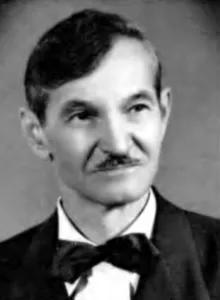
Ukrainian composer, conductor, teacher, violinist, and public figure.
Biography
Yaroslav Barnych was born on September 30, 1896, in the village of Balyntsi near Kolomyia, now Sniatyn district, Ivano-Frankivsk region, in the family of a school principal.
In 1906-1914 he studied at the Kolomyia Gymnasium. In 1914, he volunteered to join the Legion of Ukrainian Sich Riflemen. In October 1915, he passed the high school matriculation exam in Vienna.
Together with Mykhailo Haivoronsky, Yaroslav Barnych organized the Ukrainian Sich Riflemen String Quartet, which included Antin Balandiuk and Roman Lesyk. In 1916, Barnych became the conductor of the Ukrainian Theater of the Besida Society in Lviv (directed by A. Budzynskyi). He staged "The House Beyond the Village," "Hrytsia," "Natalka Poltavka," "Kateryna," "Pebbles," and others.
In 1921, he worked in the traveling troupe "Ukrainian Theater Company" of Vasyl Kossak (Kolomyia, Chortkiv, Zbarazh), as well as in the B. Ovcharsky Theater (Lviv).
In 1921-1924, he conducted the Ukrainian Theater of the Besida Society under the direction of Yosyp Stadnyk.
In 1924, Barnych graduated from the Mykola Lysenko Lviv Higher Music Institute (teachers: M. Zuna, O. Yasenytska-Voloshyn, and Vasyl Barvinsky). It took him several more years to find a job: in Uzhhorod he was the conductor of the local theater orchestra, and in Sambir he taught. In 1929, he moved to Stanislaviv (now Ivano-Frankivsk), taught at schools, gymnasiums, the Basilian Sisters' Seminary, the S. Moniuszko State Music Institute, the Polish Chopin Higher School, and conducted the Boyan there. It was a particularly creative period for the composer.
He married the actress Yaroslava Rubchak and became the father of Iryna.
This is what his wife writes about him:
"There was a lot of work, but he lived it. His work with schoolchildren was especially successful. He worked wonders with young singers and students. Every school concert was an event in Stanislaviv... It was at that time that he began to compose light genre music. I remember when I returned home from one of my vacations with my children, Yaroslav surprised us. He sat down by the zither (we didn't have a piano yet) and played two of his compositions to the words of Prof. Roman Savytskyi - two tangos: "Oh, Nightingale" and "My Boy, My Boy". We were delighted and simply forced him to continue creating something so light and melodic. In a short time, his compositions such as "Oh, Beautiful Beauty," "Too Late," "Young Emeriti," "Letter," and finally a glorious tango, the song "Hutsulka Ksenia," appeared.
Barnych entered Ukrainian music as the founder of the modern Ukrainian operetta. He composed 4 operettas in total: "The Girl from the Maslosoyuz" (1933), "Sharika" (1934), "Adventure in Church" (1936), and "Hutsulka Ksenia" (1938). The composer also worked in the genre of tango songs, creating such perfect pieces as "Oh Soloviy", "Do You Understand?", "Hutsulka Ksenia", and others. It is no coincidence that he was called the "Ukrainian Leger." He was a composer of the European school and style.
At the same time, Yaroslav Barnych is the author of the pathetic and tragic symphonic suite Baturyn and the theme to Mazepa by B. Lepkyi. This is majestic and monumental music that has not yet been performed for a symphony orchestra. Some fragments of the work were performed only at the memorial evening for Y. Barnych in Drohobych (1996, performed by O. Terletska, piano). This work was staged in its entirety in America in 1949 by Vladimir Blavatsky.
In the fall of 1939, he worked as a conductor of the Stanislaviv Music and Drama Theater, the Philharmonic Symphony Orchestra, and in 1940 he created the Hutsul Song and Dance Ensemble. During the years of German occupation, he served as the conductor of the Lviv Opera.
Before the arrival of the "second soviets", being already a well-known composer and conductor, he went into exile. West Germany (1944-1949), the United States (since 1949), working in various institutions, conducting choirs, staging operas and operettas, concerts, etc. In 1952, the Ukrainian Music Institute was founded in New York City, and Yaroslav Barnych worked at one of its branches in Cleveland and Lorain, where he taught violin and theory.
For 15 years (1951-1966), Yaroslav Barnych worked as artistic director and conductor of the Taras Shevchenko Ukrainian Choir (Cleveland, USA) and conducted more than 100 major performances (concerts and stage productions) with it. He was awarded the title of "Honorary Citizen of Winnipeg" (Canada, 1961) for his concert program dedicated to the opening of the Taras Shevchenko monument.
In 1966, the diaspora widely celebrated the 70th anniversary of the composer, presenting him with the "Golden Trampoline" made of ivory and golden wrapping. Pope Paul VI and the head of the UGCC, Josyf Slipyj, sent their greetings and blessings to the jubilee. April 23, 1966 was declared "Barnich Day" in Ohio.
On June 1, 1967, Yaroslav Barnych passed away. He was buried in Cleveland (Ohio, USA). The last work of the artist was a fairy tale play in three acts "The Magic Flute". At the request of his wife Yaroslava Barnych, the text of The Magic Flute was completed by Leonid Poltava, and the music was composed by Bohdan Saramaha and Vasyl Ovcharenko.
Memory
The Kremlin's "liberators" banned the work and name of the composer Yaroslav Barnych.
A memorial plaque was unveiled in the village of Balyntsi, where the composer was born.
In Ivano-Frankivsk and Kolomyia, streets were named after Barnych.

